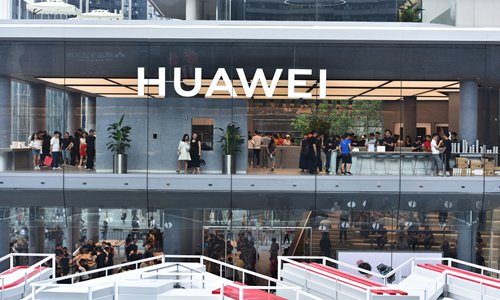HOME >> OPINION
Digital technologies: Why engagement is better than containment
By Shaun Riordan Source:Globaltimes.cn Published: 2019/9/30 10:04:31

People shop at Huawei’s first flagship store after it officially opened on Saturday in Shenzhen, South China’s Guangdong Province. Huawei’s first direct-sales store is 1,300 square meters and provides the latest 5G technology experience. Photo: IC
A recent article in Foreign Policy proposed US-EU collaboration in the regulation of cyberspace to stifle China's rising prowess in digital technology. The idea is unlikely to find acceptance in the EU, which tends to see the US and its companies as part of the problem rather than the solution. Such an "anti-China" alliance would also pose serious dangers to the development of future global technologies, with impact on global economic development. It would also risk isolating the EU from technological and economic development in emerging economies, which would find Chinese technologies irresistible.
The issue of how to contain China's technological development has been brought into focus by Huawei and its role in the development and rollout of 5G networks. Although the US has focused with allies on the security implications of Huawei's role, its real concerns relate to global industrial standards. For the first time, a company which is not American, nor is based in a country that is an American ally, is setting industrial standards for new digital technology. This matters all the more because Huawei has played a leading role in the industrial standards for the second phase of 5G, crucial to the Internet of Things.
But the real concern is that this sets a precedent for the future, with Chinese companies playing a larger role in setting industrial standards for future technologies, including artificial intelligence. International industrial standards meetings, which until now have been rather dull affairs dominated by technocrats, look set to become geopolitical battle grounds for global influence.
The proposal for close regulatory collaboration between the EU and the US overlooks their different approaches to internet governance and regulation, especially under the Donald Trump administration. Europeans, and in particular the European Commission, are very conscious of the power asymmetry between the US and the EU in cyberspace. The vast majority of internet companies, including social media platforms and search engines, which operate in the EU, are based in the US. The EU has no "internet or digital champions," despite proposals within the European Commission to try to fund some (this power asymmetry in cyberspace no longer exists between the US and China).
EU policy in cyberspace has therefore focused largely on regulating and constraining the activities of US companies in Europe's virtual and physical spaces. Thus Europe's new data protection rules - the General Data Protection Regulation (GDPR) - are aimed at fundamentally limiting the uses US internet companies can make of EU citizens' data. European competition authorities are constantly threatening to break up US internet monopolies. The digital tax, so far implemented only in France but also threatened to be imposed at the EU level, aims to prevent US internet companies making excessive profits in Europe without paying commensurate taxes. Such "anti-US" policies have already raised the ire of President Trump, who has threatened retaliation.
Thus we can see that, for European policymakers, until now the US, and American internet companies, have been part of the problem rather than the solution. Far from being collaborative, the European approach to internet regulation has been distinctly coercive. The GDPR is meant not only to be a model for global data protection. By insisting that the measure covers the data of European citizens wherever it is stored in the world, it seeks to force foreign companies to adopt measures for all their clients, European or otherwise. European regulators openly celebrate the extent to which US internet companies find it cheaper to do so, rather than identify which of their clients are European and which not. Such an attitude is not the best basis for US-EU collaboration, even once Trump has left the White House.
The debate on who will or not use Huawei in rolling out 5G shows the difficulties of securing a common position among EU members. Even if that can be achieved, and an agreement reached with the US, a joint stance to isolate Chinese technology is unlikely to work. The US push against Huawei already risks dividing 5G between different and only partially compatible technology standards. The Chinese market, larger and with greater potential for growth than the EU and US combined, will remain attractive for many companies, including in the US and EU.
Chinese technologies and industrial standards will remain attractive for many countries, especially emerging markets, both on technical and cost grounds. An exclusive EU-US collaboration risks global fragmentation between those who accept Western industrial standards and regulation and those who do not. It is not clear whether the former will dominate. The EU could find itself increasingly cut off from economic and technological developments in emerging markets.
To some extent, both Huawei and the GDPR show how difficult it is for the US and Europe to accept that they cannot simply impose international values and rule-sets as they have in the past. As in other areas, norms in cyberspace will need to be formed through diplomacy and the identification of shared preferred outcomes between a broad range of state and non-state actors. International law has always been more about reaching minimalist agreements with your enemies rather than maximalist agreements with your friends. As a global power without internet champions to protect, the EU could play a key role in constructing global rules for cyberspace, but through cyber diplomacy focused on identifying shared preferred outcomes, including with China and the US, rather than trying to exclude any given country from the conversation.
The author is director of the Department for Diplomacy and Cyberspace at the European Institute of International Studies. opinion@globaltimes.com.cn
Posted in: VIEWPOINT